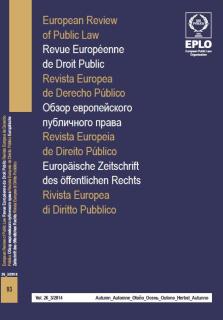
Constitutional Law / Droit constitutionnel
TURKEY / TURQUIE
FAILURE OF THE NEW CONSTITUTION-MAKING IN TURKEY
MEHMET SEMIH GEMALMAZ
Member of the Istanbul Bar Association. Former Professor of Public Law
and International Human Rights Law at the Faculty of Law, Istanbul University.
He was the Director of Istanbul University Centre for Research and Practice of Human Rights Law, and was a member of the Istanbul University delegation
at the European Public Law Organization (EPLO) Board of Directors.
Political initiatives in Turkey with regard to radical constitutional amendments continued in 2013 and the first part of 2014. To this end, the Conciliation Commission was established which consisted of only four political parties represented in the Grand National Assembly of Turkey (GNAT). Since the Conciliation Commission could not reach any meaningful consensus on important political issues, such as irrevocable articles pertaining to the form of the Turkish State, nationalism, reorganization of the State from the unitary structure to a federative structure, changing the classical parliamentary regime with the presidential system, the Conciliation Commission was illegally dissolved by the ruling party, AKP. But the most dramatic failure of the Conciliation Commission was the lack of people's participation in the Constitution-making process. Turkey has autocratically been ruled by the new President since the second half of 2014 and all constitutional rules and traditions have deliberately been ignored with a view to modify the Turkish constitutional structure from a parliamentary regime to a presidential system. This period also witnesses the promulgation of further repressive laws and continuing systematic human rights violations. Developments in the constitutional field reveal that Turkey has been suffering from legal chaos and political instability, and is becoming a sort of de facto regime.
Les initiatives politiques en Turquie concernant des amendements radicaux de la Constitution se sont poursuivies en 2103 et durant la première moitié de l'année 2014. A cette fin, la Commission de conciliation, composée de seulement quatre partis politiques représentés à la Grande Assemblée nationale de Turquie, a été établie. Etant donné que la Commission de conciliation n'a pas pu aboutir à un consensus significatif sur des questions politiques importantes, comme des articles irrévocables relatifs à la forme de l'Etat turc, le nationalisme, la réorganisation de la structure unitaire de l'Etat en une structure fédérative, le changement du régime parlementaire classique en régime présidentiel, la Commission de conciliation a été illégalement dissoute par le parti au pouvoir, l'AKP. Mais l'échec le plus dramatique de la Commission de conciliation a été le manque de participation populaire au processus d'élaboration constitutionnelle. La Turquie est gouvernée de manière autocrate par le nouveau président depuis le milieu de l'année 2014 et toutes les règles et traditions constitutionnelles ont été délibérément ignorées afin de faire passer la structure constitutionnelle turque d'un régime parlementaire à un système présidentiel. On a aussi assisté durant cette période à la promulgation de nouvelles lois répressives et à la poursuite des violations systématiques des droits de l'homme. Les développements dans le domaine constitutionnel montrent que la Turquie vit dans le chaos juridique et l'instabilité politique et est devenue une sorte de régime de facto.





















